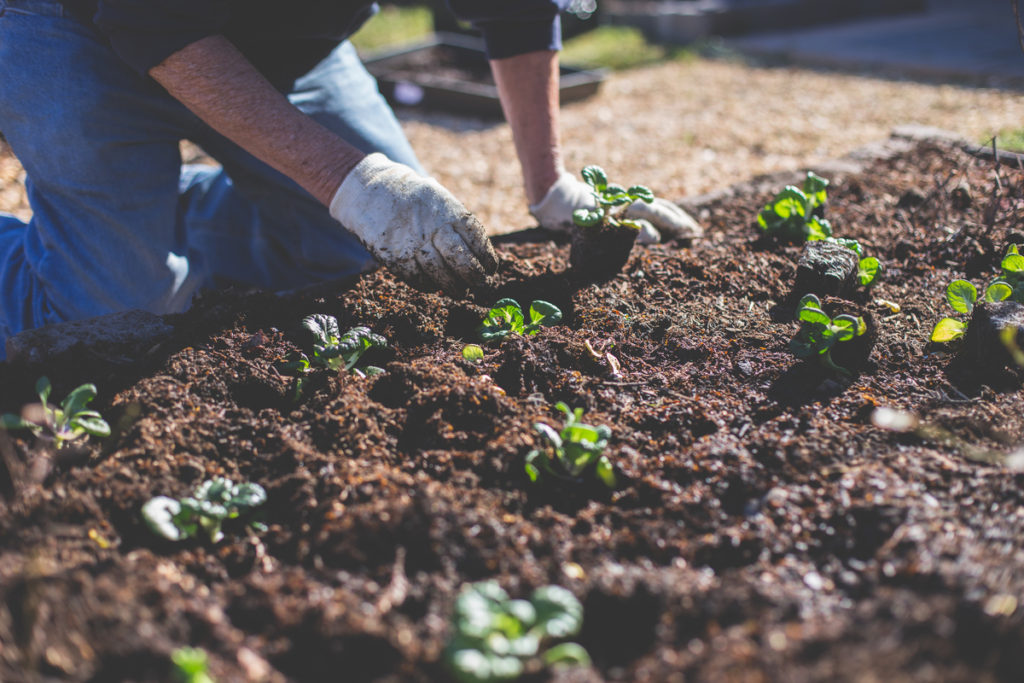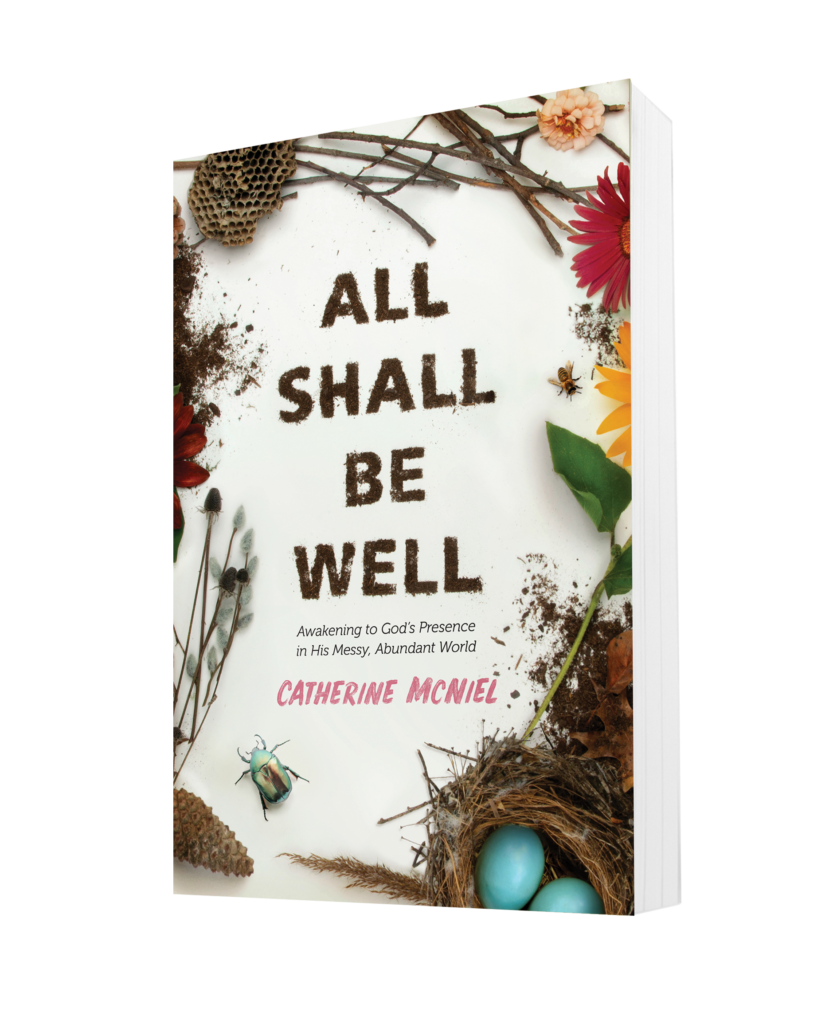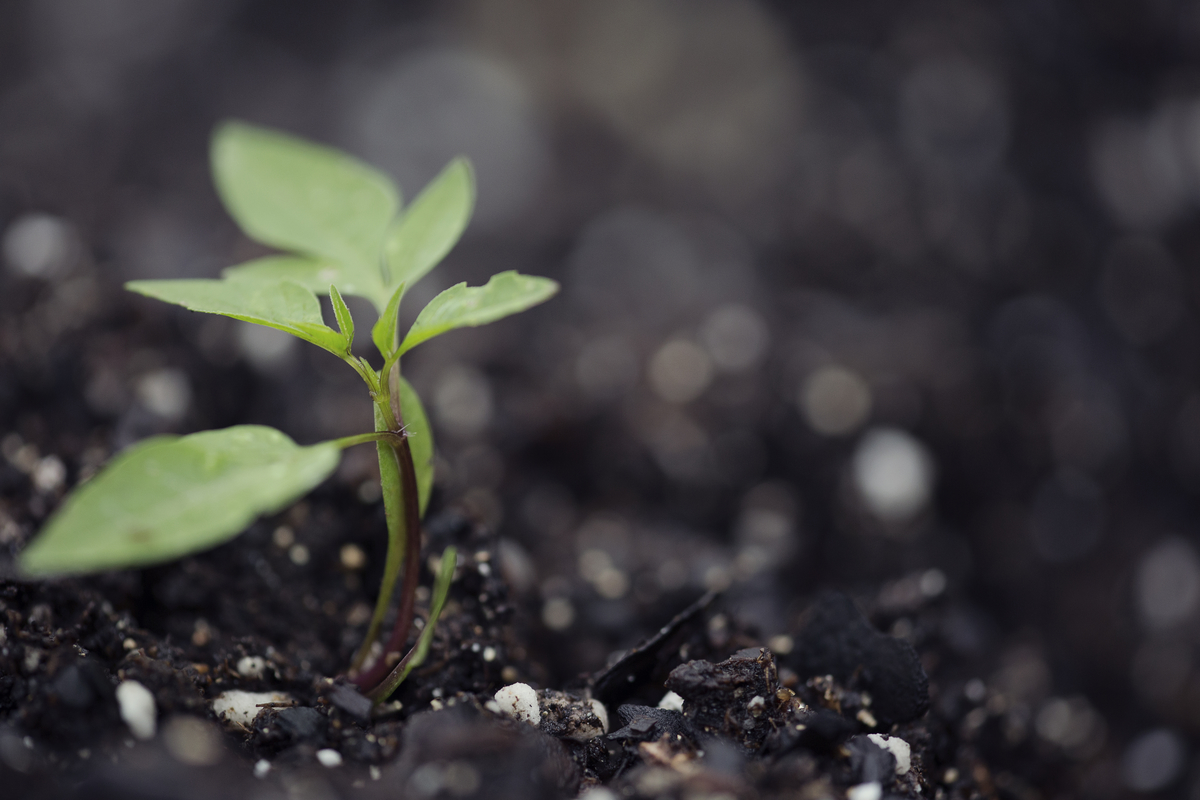When the curtain rises for the very first time, the Gardener is alone on the stage. He’s wearing dungarees, as they used to call them; overalls. He’s kneeling in the dirt, digging hands into the soil. Planting a garden.
He’s muddy, of course. Gardening is full-body, hands-on work, and the Gardener is covered in soil past his elbows and knees. When he stands up to stretch, his muddy arm smears earth across his brow.
Taking a moment to survey his accomplishments, he nods with delight—yes, this is good—then kneels and continues planting. He works carefully, lovingly, intentionally. He hums and whistles unselfconsciously, for this is his joy, his creation. This is on purpose. This is good. This is his.
With a final pat of the ground, the garden is in.
And now, something else.
Turning away from his burgeoning garden, he approaches a fresh piece of earth. Lifting clay out of the ground, he molds it, forms it. Again, lovingly, carefully, joyfully he fashions the dirt into the shape of his design, his own image. He stands back to admire the work.
Yes, this is good. This is very good.
Then something incredible happens.
The Gardener lifts the finished work in his arms and leans down, placing his face on its face, his eyes to its eyes, his mouth to its mouth—and breathes. He breathes his own sacred, holy, living breath into the image he fashioned from the dust.
And it becomes a living thing.
Seek and Find
Friend, this is our origin story, our family tree.[i] We are what the Gardener formed so long ago—you and me and folks ten thousand miles away, the mountains and oceans and prairies, the mosquitoes buzzing around my porch light, the dandelions growing through the cracks in your sidewalk. His garden covers the earth, his breath fills the universe. It has become you and me and all living things.
Psalm 19 says that creation proclaims the truth about the Creator—day after day, night after night.[ii] Without speech or sound or words, this voice carries to the end of the world, and in this noiseless declaration, God teaches us, right here among the earth and sky, trees and flowers, neighbors, children, and creepy-crawlies. The Gardener entreats us to step into the world he made and walk with him, to receive from his hand the daily bread our bodies, minds, and hearts so deeply crave. We are the clay that God is still molding, still nurturing, through the repetition of cycles and seasons, in the mess and abundance of our daily lives.

But there is a problem, a foil: We modern humans rarely look for truth in the soil and stars. In fact, we scarcely spend time outside. I live in a factory-made world of concrete and central heating, buying processed food and clothes with little idea how to trace these shrink-wrapped items back to their origins in the ground. Since we think of truth as residing in words and ideas, we tend to limit seeking God to such things, seldom even noticing the cycles of living and dying that govern our lives—or receiving the wisdom he offers through them.
I wonder about the spiritual atrophy[iii] we experience by living cutoff from the earth. In how many countless ways have we lost the ability to seek and find our Creator? We’ve worked so hard to isolate ourselves from the realities of creatureliness, but have we also removed ourselves from God’s provision, the wisdom and sustenance he offers? We desperately thirst for something more but have grown unseeing, unhearing, unable to absorb the truth and glory always proclaimed by earth and sky.
People sometimes describe themselves as “spiritual but not religious,” but in my circles we often show symptoms of the opposite aliment: We memorize verses and learn facts, and we’re prepared to defend them; our doctrinal statements are read and signed. Sometimes it seems we’d rather categorize God than be with him. We opt for merely signing off on God’s résumé.
But faith is a journey of spiritual formation, a character-shaping relationship with the living God. Robert K. Johnston describes our dilemma perfectly:
In the vestibule of an auditorium there were two doors. Above the one door was a sign labeled “heaven.” Above the other door was a sign labeled “lecture about heaven.” And people flocked through the door labeled “lecture.”[iv]
Even back in the garden, Adam and Eve fell into trouble when they adopted the habit of talking about God rather than speaking to him. Suddenly, the Gardener began to appear not quite as life-giving and intimate, perhaps not entirely trustworthy. From there, the relationship was all-too-easily broken.
We do this still, losing intimacy and trust when we avoid talking to someone and instead talk about them. How much more so with the one who made us and knows us inside out? Time and again, we slide into this pattern, speculating and debating about God rather than searching for him.
But he is here.
Our God is not far off. From the very beginning, Christians have declared that the Creator is not only transcendent but immanent. In his transcendence, God is perfect, whole, other. This means we cannot grasp or tame him, we cannot overpower or domesticate him. Yet God is also immanent: crucially, palpably present. Wherever we go, all we must do is lift our faces, hold out our hands, or take in a breath—and find him here with us.
Can you imagine the trouble we’d be in if God were only one of these? If God was near but not sovereign, our hope would be frail, like second-brew tea or weak coffee. If he were transcendent but not present—well, isn’t that the actual definition of hell?
He has promised to meet us, he has promised to be found—if we can open our distracted, weary, frightened eyes and see.
You’ve been reading with Catherine McNeil from All Shall Be Well: Awakening to God’s Presence in this Messy, Abundant World. Get a copy or read a free excerpt of chapter one here. Head over to allshallbewellbook.com to get to know Catherine and her writing on faith, motherhood, and many other beautifully messy topics.

[i] A paraphrase of the Creation story in Genesis 2, not to be confused with the Creation story in Genesis 1.
[ii] Psalm 19:1-4.
[iii] Margaret Feinberg, Wonderstruck: Awaken to the Nearness of God (Brentwood, TN: Worthy, 2012), 51–57.
[iv] Story from Søren Kirkegaard, as told in Robert K. Johnston, God’s Wider Presence: Reconsidering General Revelation (Grand Rapids, MI: Baker, 2014), 1.

